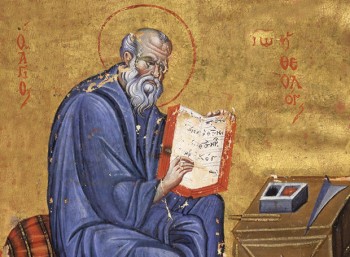Today our Church celebrates the memory of Holy Apostle and Evangelist John the Theologian, the “beloved disciple” of the Lord and Saint Arsenius the Great.
Saint John is called the “son of thunder” and together with his brother James became bright Apostles who spread the Gospel of Resurrection.
Initially, John will learn about the Messiah from John the Baptist and, at the suggestion of John the Baptist, he will become a disciple of Jesus Christ.
Evangelist John is the beloved student. Thanks to his prudence and composure, he will bear witness to the great events for the salvation of humankind. He, his brother James, and Peter will bear witness to the Transfiguration of the Savior at Mount Tabor. He is the disciple who at the Last Supper will lean on Jesus and wonder who can commit the unjust act of betrayal.
He will also witness the agony of Christ in the Garden of Gethsemane and then in the house of the high priest more closely than the other Apostles did. Most importantly, he remained near Jesus at the foot of the cross, while all the disciples abandoned Christ. John heard the Crucified Jesus saying, “Here is your son. […] Here is your mother.” From that time on, John took the Virgin Mary into his home.
Saint John the Apostle wrote down what he witnessed in the fourth Holy Gospel and wrote down his experiences as a disciple of Jesus, the most theological of the other three.
He spoke to us about love in the three catholic epistles, and for the Church he was established as the Apostle of Love. He also wrote down the vision that God revealed to him in the prophetic book, Book of Revelation, the last book of the New Testament, which requires special attention, prayer and the experience of the Church for someone to study it.
Those were the words of Saint John: “Dear friends, since God so loved us, we also ought to love one another. No one has ever seen God; but if we love one another, God lives in us and his love is made complete in us.”
Source: Church of Cyprus
